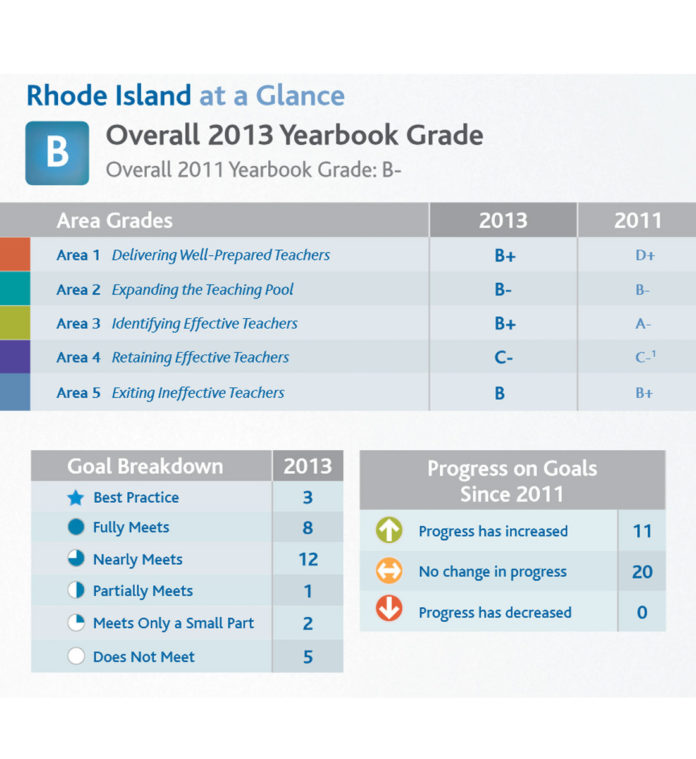
WASHINGTON – Rhode Island has earned a “B” for its teacher-effectiveness policies, one of the highest grades in the nation, according to the 2013 State Teacher Policy Yearbook released Thursday by the National Council on Teacher Quality.
Rhode Island was one of just four states to receive a grade of B or higher for policies applied in public education last year. The other three states were Florida, Louisiana and Tennessee.
The average grade across all 50 states and the District of Columbia was C-, according to the report, and no state received higher than a B+.
The National Council on Teacher Quality is a nonprofit, nonpartisan research and advocacy group committed to restructuring the teaching profession based on the belief that all children deserve effective teachers. Its seventh annual State Teacher Policy Yearbook included a “360-degree analysis” of every state law, rule and regulation that shapes teacher effectiveness in Rhode Island.
According to the yearbook, Rhode Island’s 2013 overall teacher-policy grade of B improved on its score of B- in 2011, the last year the state’s full portfolio of teacher policies was graded, and jumped two full grade levels from a D in the 2009 report.
“This year’s State Teacher Policy Yearbook proves that it is both possible and practical for states to drive teacher effectiveness policy,” said council President Kate Walsh in a prepared statement. “Many states once argued that raising the bar for teacher preparation, licensing and evaluation and tying personnel decisions to results for kids couldn’t be done. Now, these policies are on the books in increasing numbers of states across the nation.”
To get the “B” average for 2013, Rhode Island earned the following grades in five policy-related areas:
- Delivering Well-Prepared Teachers: B+
- Expanding the Teacher Pool: B-
- Identifying Effective Teachers: B+
- Retaining Effective Teachers: C-
- Dismissing Ineffective Teachers: B
Rhode Island is one of 28 states that require annual evaluations for all teachers and is one of 35 states that identify student achievement and growth as an important criterion in evaluating teacher effectiveness, the State Teacher Policy Yearbook said.
While Rhode Island earned the highest grade of B+ for progress in setting higher standards for the preparation of teachers, there is more to be done, the council said. Specifically, Rhode Island faces “significant” loopholes in its requirements for secondary teacher licensing that do not ensure teachers pass a content test in every subject they are licensed or endorsed to teach.
In addition, Rhode Island is one of 34 states that do not ensure elementary teachers’ knowledge of effective reading instruction, the report found.
Unlike many states, Rhode Island requires that all teachers receive feedback on their evaluations, that professional development be informed by evaluation findings, and that schools form improvement plans for teachers with poor evaluation ratings, the report noted, but like 25 other states, Rhode Island does not support performance pay.
To view the full report, visit www.nctq.org.












